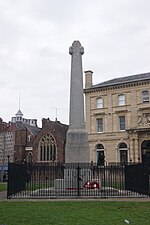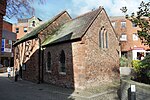Exeter Guildhall
Buildings and structures in ExeterCity and town halls in DevonGovernment buildings completed in 1470Grade I listed buildings in DevonGuildhalls in the United Kingdom ... and 2 more
Tourist attractions in ExeterUse British English from April 2022

Exeter Guildhall on the High Street of Exeter, Devon, England has been the centre of civic government for the city for at least 600 years. Much of the fabric of the building is medieval, though the elaborate frontage was added in the 1590s and the interior was extensively restored in the 19th century. It is a Grade I listed building.
Excerpt from the Wikipedia article Exeter Guildhall (License: CC BY-SA 3.0, Authors, Images).Exeter Guildhall
High Street, Exeter St Thomas
Geographical coordinates (GPS) Address External links Nearby Places Show on map
Geographical coordinates (GPS)
| Latitude | Longitude |
|---|---|
| N 50.7233 ° | E -3.5318 ° |
Address
Guildhall
High Street
EX4 3HE Exeter, St Thomas
England, United Kingdom
Open on Google Maps











